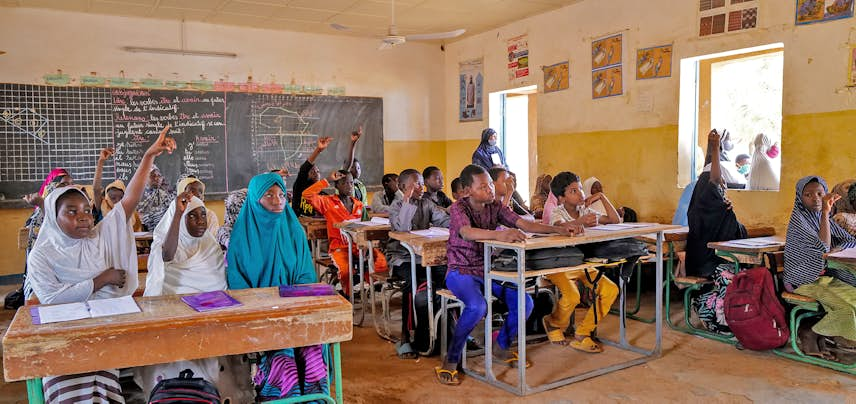Gender
“WOMEN’S RIGHTS TO TAKE CENTRE STAGE IN ” 1
The year 2020 was a landmark year for gender equality, for many reasons. Five years after the launch of the Sustainable Development Goals (SDGs), 20 years after the historic resolution of the United Nations Security Council on women, peace and security, 25 years after the Beijing Declaration and Platform for Action, 2020 is an important year for reflection, commitment and action.
Launched at the end of 2020, the EU’s third action plan to promote gender equality reaffirms that gender equality and the empowerment of women and girls (GAP III) continues to be a key political aim in EU external action.
Since then, the world has made considerable progress, but there is still a long way to go to achieve gender equality. Hard-won advances have been fundamentally questioned and new challenges have emerged.
Three quarters of the world’s countries today have laws on domestic violence, but globally 137 women are killed each day by a member of their own family; in the European Union, one woman in ten says that they have been the victim of cyber-harassment after the age of 15.
More women and girls can access education, but the gap between the genders in relation to participation in the labour market remains unchanged. Everywhere, it is women that take on the greater share of non-remunerated care and domestic work, often to the detriment of their careers and their participation in the economy. And while global poverty has fallen, it remains a significantly female issue: women aged between 25 and 34 are 25% more likely than men to be living in extreme poverty.
THE CORONAVIRUS CRISIS: A NEW GENDER GAP?
The stakes have become even higher since the coronavirus pandemic has been ravaging the planet, as periods of great crisis often put women on the front line. They take crucial decisions on how to tackle the effects of the crisis on public health, society and the economy, but at the same time they are disproportionately affected by the pandemic. Employment and working conditions have been turned upside down, raising the question of a possible reversal of the progress made on gender equality. Increased participation by women in the ongoing recovery from the COVID-19 pandemic will be crucial in rebuilding more inclusive, fairer and more ecological societies.
At the current pace, it will take another 100 years to achieve parity between the genders in the areas of politics, the economy, health and education, according to the conclusion of the Global Gender Gap Report 2020. But it doesn’t have to be this way. The report also points to the areas where progress can be made in gender equality, such as: an increase in political representation of women, the establishment of affordable care infrastructure and the fair sharing of domestic tasks and care activities, as well as teaching young women and girls the skills they need to succeed in their future jobs.
Luxembourg reaffirms its unwavering commitment to the Beijing Platform for Action and all the actions to promote gender equality described in it. The strengthening of women’s and girls’ rights is a key element of the overall aim in Luxembourg Development Cooperation’s general strategy, and one of the three cross-cutting issues on which its actions focus. Thus, in 2020 Luxembourg’s Development Cooperation pursued its mainstreaming approach to the issue through its cooperation projects and programmes, aiming to achieve consistency. The actualisation of women’s rights as fundamental human rights and of gender equality requires a coordinated and multi-sectoral approach that involves all stakeholders, including civil society and women’s organisations, as well as the business world.
In line with the aim of adopting a sensitive approach to gender, in 2020 Luxembourg’s Development Cooperation revised its former gender strategy on the basis of political and strategic guidelines developed at international, European and national levels. This was designed to integrate the dimension of gender and gender equality into all the projects and programmes supported by official development assistance, as well as into our institutional structure.
Luxembourg submitted its response to the EU’s 2019 Report on the Gender Action Plan (GAP). It also participated in the targeted consultation in preparation for the third action plan for the 2021 – 25 period. At the meeting of the Foreign Affairs Council in its development configuration in November 2020, Minister Franz Fayot supported the implementation of GAP III for gender equality throughout the world. He also urged the Council to adopt ambitious targets (including 85% of actions linked to gender in external action) and the maintenance of ambitious language (gender equality instead of equality between men and women).
Luxembourg’s Development Cooperation pursues a zero-tolerance approach to sexual and gender-based violence in its programmes and also within the institution itself. In line with this approach, since the start of 2020 any NGDO requesting financing from the MFA must first have subscribed to a Charter against sexual harassment, exploitation and abuse, put forward by the OECD’s Development Aid Committee (DAC) in 2019. By subscribing to this Charter, every NGDO subscribes to a set of minimum commitments to combat any form of sexual exploitation and abuse and sexual harassment (SEAH).
Luxembourg has argued vigorously for the strongest possible language regarding women’s and girls’ human rights in all international forums. Within this context, in 2020 Luxembourg was one of the signatories of a joint letter from donors to the Secretariat of the United Nations Executive Board on the inclusion of SEAH aligned language for multilateral organisations.
To support the fight against sexual and gender-based violence, Luxembourg’s Development Cooperation was the first international donor to confirm its support to the Dr Mukwege’s Panzi hospital for women and children in the Democratic Republic of Congo, with a budget of EUR 5 million. The project’s particular point of difference is that it provides holistic support for the treatment of rape victims while facilitating their access to justice.
